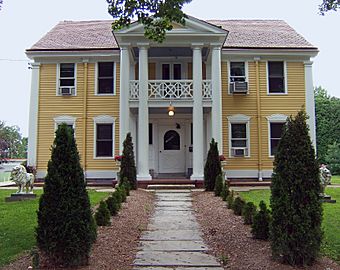Gov. Samuel Huntington House facts for kids
|
Gov. Samuel Huntington House
|
|
|
U.S. Historic district
Contributing property |
|

Gov. Samuel Huntington House
|
|
| Location | 34 East Town Street, Norwich, Connecticut |
|---|---|
| Area | 2 acres (0.81 ha) |
| Built | 1783 |
| Architectural style | Georgian |
| Part of | Norwichtown Historic District (ID730019751) |
| NRHP reference No. | 70000725 |
Quick facts for kids Significant dates |
|
| Added to NRHP | October 6, 1970 |
| Designated CP | January 17, 1973 |
The Gov. Samuel Huntington House is a special old house located at 34 East Town Street in Norwich, Connecticut. It was built in 1783 for Samuel Huntington. He was a very important person in American history. Samuel Huntington signed the United States Declaration of Independence, which declared America's freedom. He also served as a Governor of Connecticut. This house was added to the National Register of Historic Places on October 6, 1970. It is also part of the Norwichtown Historic District, an area with many historic buildings.
Contents
Exploring the Huntington House
The Governor Samuel Huntington House stands in the Norwichtown area of Norwich. This neighborhood was one of the first places settled in the city. The house is on the south side of East Town Street. It is just west of where East Town Street meets Huntington Lane.
What the House Looks Like
The house is a two-and-a-half-story building made of wood. It has a roof that slopes down on two sides. The outside walls are covered with overlapping wooden boards called clapboard.
A very noticeable part of the house is its large front porch. This porch goes up two full stories. It has a triangular top, like a small roof, supported by pairs of tall columns. The main front door has windows on its sides and fancy carved wood around it. There is also a porch with a crisscross design above the main entry. Some parts of the house, like the front porch, were changed in the 1800s. The inside of the house has also been changed quite a bit. This is because it was used as an office in the 1900s.
Samuel Huntington's Life and Legacy
The house was built in 1783 for Samuel Huntington. He was one of the most important people in Norwich at that time.
Early Life and Political Beginnings
Samuel Huntington was born in Scotland, Connecticut. He moved to Norwich in 1763. Soon after, he began to represent the town in the colonial legislature. This was like a government meeting for the colony.
A Leader in the American Revolution
Huntington was a member of Connecticut's committee of safety. This group helped protect the colony during the American Revolution. He also served in the Continental Congress. This was a meeting of leaders from all the American colonies. While there, he signed the United States Declaration of Independence. This important document declared that the American colonies were free from British rule. He even served as the president of the Continental Congress for one year.
Governor of Connecticut
In 1786, Samuel Huntington became Connecticut's third governor. He held this important job for ten years. He remained governor until he passed away.



